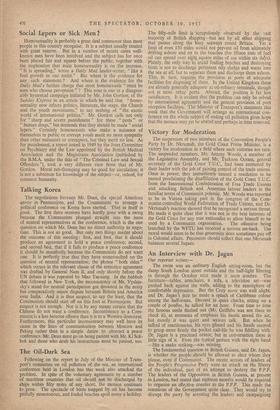Talking Korea
The negotiations between Mr. Dean, the special American envoy in Panmunjom, and the Communists to arrange a political conference on Korea have started. That in itself is good. The first three sessions have hardly gone with a swing because the Communists plunged straight into the issue of neutral representatives at the conference, which is the one question on which Mr. Dean has no direct authority to nego; tiate. This is not so good. But only two things matter about the outcome of this meeting : first, and best, that it should produce an agreement to hold a peace conference; second, and second best, that if it fails to produce a peace conference it should be manifestly because the Communists do not want one. It is perfectly true that they have somersaulted on the question of neutral representation; the phrase " both sides" which occurs in the relevant clause of the armistice agreement was drafted by General Nam 11, and only shortly before the UN debate it was repeated by Mao Tse-tung. In the hubbub that followed in New York, the inconsistency of Mr. Vyshin- sky's stand for neutral participation got drowned in the noisy but comparatively minor dispute between Britain and America over India. And it is thus suspect, to say the least, that the Communists should start off on this foot at Panmunjom. But suspect is not enough. Nor is it by any means certain that the Chinese do not want a conference. Inconsistency to a Com- munist is a less heinous offence than it is to a Western democrat. Furthermore, this particular inconsistency may well have its cause in the lines of communication between Moscow and Peking rather than in a -simple desire to obstruct a peace conference.14r. Dean must go on being patient with Mr. Ki Sok- bok and those who draft his instructions must be patient, too.


































 Previous page
Previous page